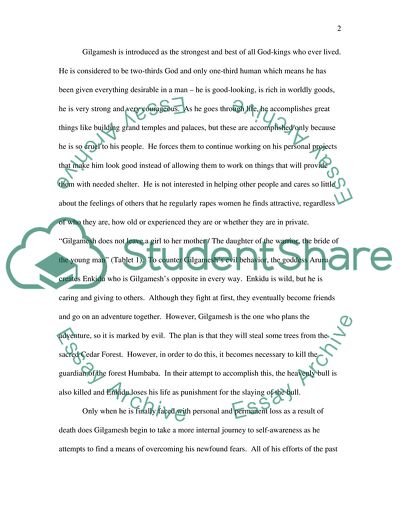
- Home
- Free Samples
- Premium Essays
- Editing Services
- Extra Tools
- Essay Writing Help
- About Us
- Studentshare
- Subjects
- Miscellaneous
- Journal about gilgamesh character
Journal about gilgamesh character - Essay Example

- Subject: Miscellaneous
- Type: Essay
- Level: Masters
- Pages: 4 (1000 words)
- Downloads: 0
- Author: zbrekke
Extract of sample "Journal about gilgamesh character"
There is an infinite continuity of meaning that can be comprehended only by seeing again, for ourselves. We read stories – and reading is a kind of re-telling – not to learn what is known but to know what cannot be known, for it is ongoing and we are in the middle of it” (Brown, 1996). In other words, by reading other people and how they’ve answered these problems, we can make better decisions based on the character’s successes and failures. Some stories work better as examples or warnings than others.
A good example of this kind of story is the Epic of Gilgamesh. In his story, Gilgamesh is not able to achieve enlightenment until he transforms his spirit even though outwardly he is the example for his society. Gilgamesh is introduced as the strongest and best of all God-kings who ever lived. He is considered to be two-thirds God and only one-third human which means he has been given everything desirable in a man – he is good-looking, is rich in worldly goods, he is very strong and very courageous.
As he goes through life, he accomplishes great things like building grand temples and palaces, but these are accomplished only because he is so cruel to his people. He forces them to continue working on his personal projects that make him look good instead of allowing them to work on things that will provide them with needed shelter. He is not interested in helping other people and cares so little about the feelings of others that he regularly rapes women he finds attractive, regardless of who they are, how old or experienced they are or whether they are in private.
“Gilgamesh does not leave a girl to her mother / The daughter of the warrior, the bride of the young man” (Tablet 1). To counter Gilgamesh’s evil behavior, the goddess Aruru creates Enkidu who is Gilgamesh’s opposite in every way. Enkidu is wild, but he is caring
...Download file to see next pages Read MoreCHECK THESE SAMPLES OF Journal about gilgamesh character
Compare and contrast King Gilgamesh with Enkidu
The Epic of Gilgamesh
The Journeys of the Ages - Gilgamesh, Beowulf, Gawain, and Dante
Comparing Job and Gilgamesh as Suffering Heroes
Epic of Gilgamesh - Power of the Relationship of Gilgamesh and Enkidu
The Epic of Gilgamesh
Epic of Gilgamesh as the Heroic Saga of a Demigod
Gilgamesh, The Odyssey and the Hebrew Bible-Roles of Men and Women

- TERMS & CONDITIONS
- PRIVACY POLICY
- COOKIES POLICY